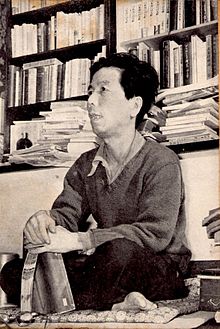Miyoshi Tatsuji
Miyoshi Tatsuji ( Japanese 三好 達 治 ; born August 23, 1900 in Osaka ; died April 5, 1964 ) was a Japanese poet, translator, and essayist.
Live and act
Miyamoto Tatsuji was born in Osaka as the eldest son of a large family who lived in modest circumstances. From 1915 to 1921 he pursued a military career, first at the Ōsaka cadet school of the army, then during a brief stationing in Korea. After that he enrolled in the old style third high school and studied literature. Already from 1914 he observed the literary trends, was impressed by the writings of Turgenev and Nietzsche and began to write his first haiku under the influence of the poet Maruyama Kaoru .
In 1930 Miyoshi published his first larger volume, free verse under the title "Vermessungsschiff" (測量船; Sokuryōsen). After that he continued to write steadily and with great variety. He went to Tokyo, where he studied French literature at Tōkyō University from 1925 to 1929 and made translations by Charles Baudelaire and other writers who received attention. Miyoshi was also an active editor and critic.
During this time he edited the magazine Aozora (青 空) with Kajii Motojirō and Nakatani Takao (中 谷 孝 雄; 1901–1995) . Here he successfully published his first poems, which caught the attention of the literary critic Hagiwara Sakutarō . With this he founded the literary-critical journal Shi to Shiron (詩 と 詩論) in 1928 , where he wrote not only his own verses but also translations, etc. a. of the entire Le Spleen de Paris collection by Baudelaire (1929). From 1934 he published the second series of Shiki magazine with Hori Tatsuo and Maruyama Kaoru , around which authors gathered who combined classical Japanese literature with contemporary European influences.
With Itō Shinkichi (伊 藤 信 吉; 1906-2002) he brought out a comprehensive edition of the works of Hagiwara Sakutarō . His work on Hagiwara, which appeared in 1963, is considered one of the best works on this poet. With Yoshikawa Kōjirō (吉川 幸 次郎; 1904–1980) he wrote a bestseller commentary on the poems of the Tang period . In 1952 he published “Sitting on the Hump of a Dromedary” (駱駝 の 瘤 に ま た が つ て, Rakuda no kobu ni matagatte), and in the same year he was awarded the Academy of Arts Prize .
Remarks
- ↑ This type of school corresponded to the first semesters at today's university.
| personal data | |
|---|---|
| SURNAME | Miyoshi, Tatsuji |
| ALTERNATIVE NAMES | 三好 達 治 (Japanese) |
| BRIEF DESCRIPTION | Japanese poet, translator, and essayist |
| DATE OF BIRTH | 23rd August 1900 |
| PLACE OF BIRTH | Osaka |
| DATE OF DEATH | April 5, 1964 |
